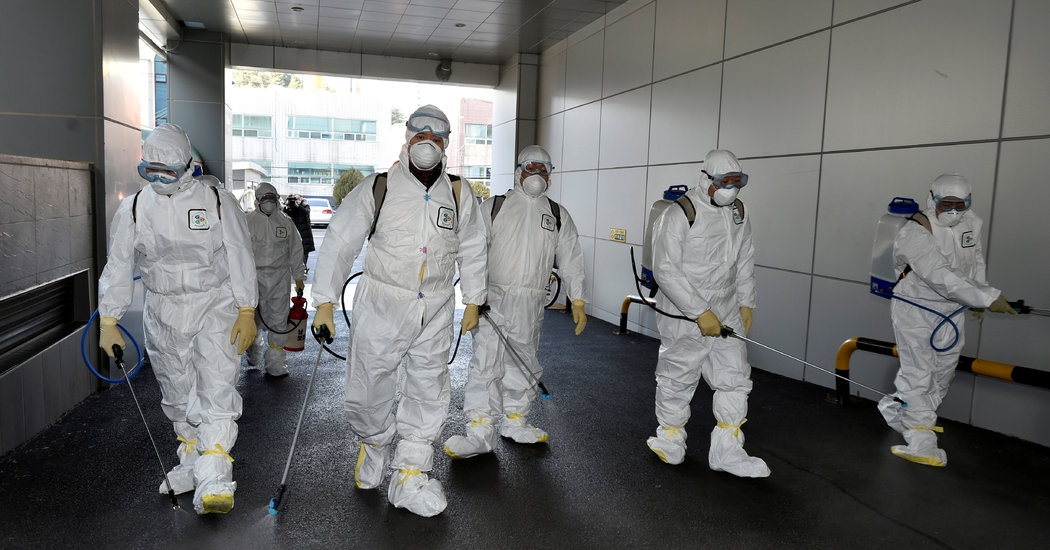Cases in South Korea surge as officials focus on a church.
South Korea said on Friday that the number of confirmed cases of coronavirus infection rose to 156, a near tripling over three days.
Among the 52 new cases reported on Friday, 41 are in Daegu, a city of about two and half million people in the southeastern part of the country, and the surrounding region, South Korean disease control officials said in a statement. Among those, 39 of the new cases were connected to a church called Shincheonji.
Officials said a 61-year-old woman who had attended services at the church over the past two Sundays had been identified as a potential source of the spread of the virus.
The new figures give South Korea the world’s second largest number of confirmed cases if those from the Diamond Princess cruise ship are not included in Japan’s total. The vast majority of cases are in mainland China, which has reported more than 75,000 cases. Japan has 94 cases, which does not include the more than 600 people who had been on board the Diamond Princess cruise ship.
South Korea reported on Thursday what officials said could be its first death from the coronavirus. A 63-year-old patient with symptoms of pneumonia died on Wednesday at the Daenam Hospital in Cheongdo.
The company that makes iPhones said it would be cautious in resuming work at its Chinese factories.
With much of China still on lockdown, businesses are struggling to get up and running.
Foxconn, the Taiwan company that manufactures Apple’s iPhones and other gadgets, indicated just how difficult that will be on Thursday. The company said its revenues would take a hit from the spread of the coronavirus, and that it would be “cautious” in resuming work at its factories in China. Plants outside of the country, in places like Vietnam and Mexico, were at full capacity, the company said.
The warning comes as Chinese leaders try to balance restarting the economy with controlling the virus. Following repeated extensions of the Lunar New Year holiday, many migrant workers remain at home, many facing mandatory quarantines and lockdowns. A number of businesses and officials have issued warnings that such policies need to be relaxed to avoid a new economic crisis.
Even if factories get all their workers back, other policies are likely to make life difficult. Some local governments require new preventive measures, like masks for workers or housing a single worker in each dorm room. In other cases, cities have invoked mandatory two-week quarantines on all returning workers. Some cities are arranging transportation to get workers back.
Concerns about production at Foxconn, the world’s largest contract manufacturer of electronics, also underscore the broader impact the epidemic could have on global supply chains. A huge portion of the world’s electronics come out of China’s factories, filled with parts also made in China’s factories, and a longer suspension of production could hit overall supply. Some have even warned that it could hasten a decoupling, which has been urged at times by both Chinese and American leaders citing security concerns.
China’s deaths and infections rise after officials change their methodology again.
Chinese officials announced on Friday that 889 new cases of the coronavirus had been reported in the previous 24 hours, raising the overall total above 75,000.
The death toll went up by 118, to 2,236.
All but three of the new deaths were in China’s central Hubei Province, the focus of the outbreak. Hubei was also the source of nearly three quarters of the new confirmed cases of infection.
The new count came one day after Chinese health authorities said they were using new criteria to count cases of the coronavirus. The move appeared to undo a change they made last week.
That earlier change allowed health officials in Hubei to count cases diagnosed in clinical settings, including with the use of CT scans showing lung infections, not just those confirmed using specialized kits to test for the virus.
On Thursday, officials said Hubei would now resume using the same criteria as the rest of the country. Cases will be considered confirmed only if the virus is found.
Trials for two coronavirus drug therapies to begin.
The World Health Organization said on Thursday that two new drug therapy trials to help fight the coronavirus are set to begin in China and that early results may be available within three weeks.
One trial involves an experimental antiviral drug made by Gilead. It has not yet been licensed for use.
The drug was tested against the Ebola virus in Congo, where it was not very effective. But when it was given to the first American known to be infected with the coronavirus, an unidentified man in Washington State, he recovered.
The second trial involves a combination of two anti-H.I.V. drugs that is sold as Kaletra in the United States and available in generic versions.
If either therapy helps prevent severe pneumonia, sepsis or organ failure in coronavirus patients, death rates may fall. Two other drugs — favipiravir and chloroquine — have also been discussed as potential treatments.
To protect their family, doctors turn to self-imposed isolation.
Eunice Chan, a physician in Hong Kong, removes her face mask only to shower, eat and drink. When her three daughters, ages 7, 9 and 12, gather around the dining table to eat, she takes her meal in another room.
“There’s no more hugging, no more kissing,” she said. “This is especially difficult for my youngest daughter.”
Her self-imposed isolation is understandable. In Hong Kong, there have been two deaths and 68 confirmed cases of Covid-19, the disease caused by the new coronavirus. And the city shares a porous border with the mainland, where more than 100 people on average have died of the disease every day since Feb. 1.
The risks, and anxieties, in the Chan household are particularly high. Both Dr. Chan, 44, and her husband, Dr. Pierre Chan, 43, have taken extraordinary measures to treat their patients and protect their family.
Dr. Pierre Chan, a gastroenterologist at a public hospital and a member of Hong Kong’s legislature, this month examined five patients infected with the coronavirus.
Though he was wearing full protective gear and his hospital did not require him to go into quarantine, he slept on the floor of his office for 14 days to avoid the possibility of infecting his daughters and his in-laws.
“I don’t dare go home,” he said. “I don’t even dare to go into hotels. You never know: I could be asymptomatic. Maybe a tiny bit of the virus got onto my clothes.”
Reporting was contributed by Paul Mozur, Donald G. McNeil Jr., Choe Sang-Hun, Paul Mozur, Roni Caryn Rabin, Carlos Tejada and Tiffany May.
















